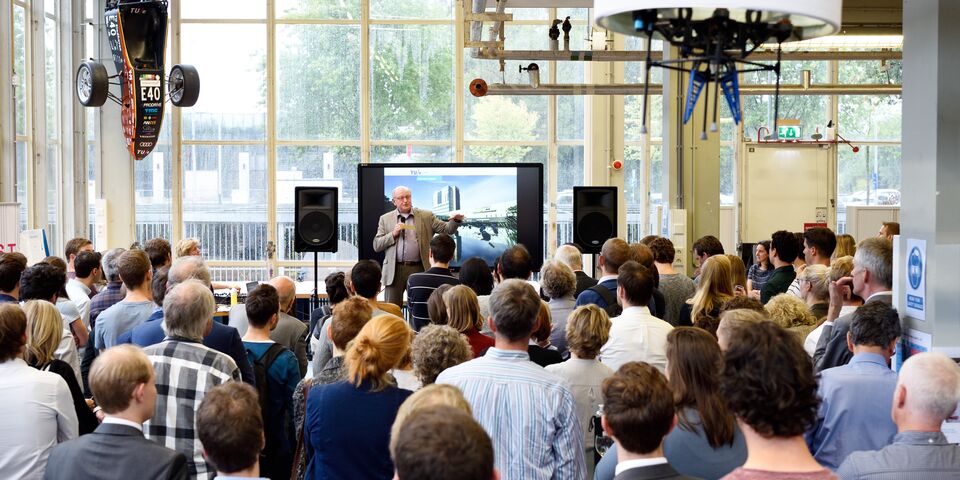TU/e innovation Space gets off to an ambitious start
The TU/e innovation Space, which was officially opened Thursday afternoon, is intended to drive the continued development of TU/e's hands-on education. In cooperation with lecturers, researchers and industry, students will work here on societal challenges. Scientific director Isabelle Reymen is confident that the initiative will rapidly give rise to a close community.
Ambition and appealing prospects are not in short supply at the Gaslab, where yesterday the TU/e innovation Space held its official opening. The space, formerly used by Studium Generale for performances and workshops, has undergone a considerable metamorphosis in the past six months. The large open area on the ground floor is full of robust work benches where groups of students will soon be able to set about activities such as building prototypes. Technical support and guidance will be on hand. Upstairs are meeting rooms and work places.
As was further emphasized by the various speakers, among them Jan Mengelers, the President of the Executive Board, the TU/e innovation Space is not about providing extra space for only student teams. The main priority is to offer hands-on education, though Mengelers admits that it was the student teams that inspired him and Rector Magnificus Frank Baaijens to launch this initiative. “When I took up my position three-and-a-half years ago, I was amazed to see what these teams were capable of. They were taking a multidisciplinary approach, were extremely creative and innovative, and working in close cooperation with all kinds of industrial partners. And had achieved all this in a relatively short period,” he said. He believes that all students should be given the opportunity to work in this way.
Lex Lemmens, naturally also present at the opening in his capacity as Dean of the Bachelor College, sees this as the future of education. “Before long this will be the main thing bringing students to the campus, hands-on education. You will find them mainly in our labs. If it is up to me, this approach will soon account for 80 percent of our education.” This was said with a smile, because he knows there is still a long way to go, and that the TU/e innovation Space has a vital role to play in this development.
Rapid start
Lemmens is pleased with this rapid start in the Gaslab. “We could have postponed it, and got things up and running only once the Matrix building was ready for it in 2018, but the sooner we start the better, and Matrix may well have been too big in the early days. This building has the right scale for launching something like this.”
Scientific director Isabelle Reymen says that in the first quarter four courses are already scheduled to make use of the Gaslab. “The great majority of the work benches are earmarked for that, but there are also a few available for student teams. They can reserve them. In addition, we are expecting students on the Honors Program and fledgling student entrepreneurs from our own university. In time, we want this to become a close community, where people inspire and motivate each other. It is hoped that industry too will see it as a highly interesting place, something they want to be a part of.”
At the opening many speakers voiced the expectation that the Gaslab would continue as part the TU/e innovation Space after the relocation to the Matrix building.







Discussion